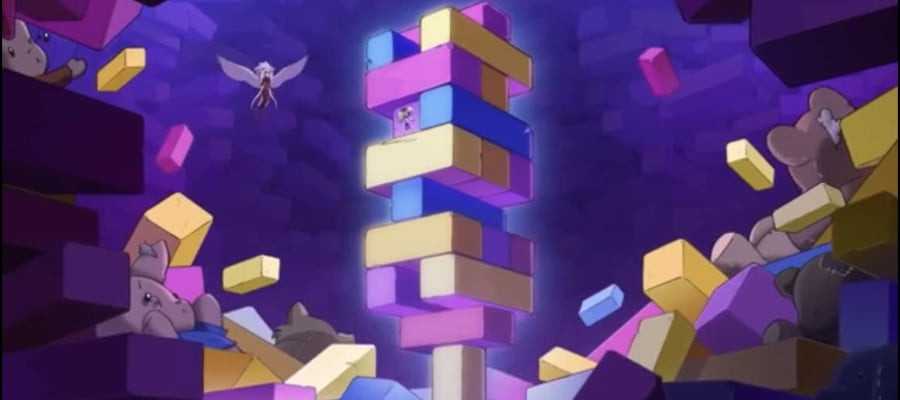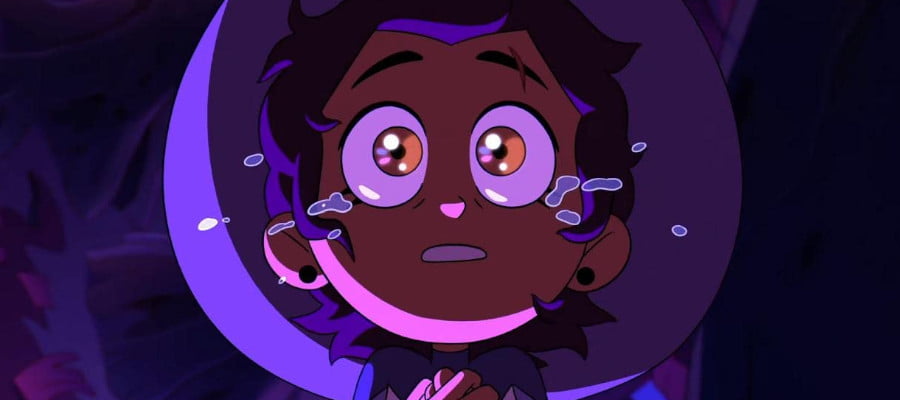Chances are good you already know what The Owl House is, and chances are even better, you’ve already seen the finale trilogy of episodes if you’re reading this. If you’re not, however, and if you’re just one of the people who likes hearing me talk about kid’s cartoons that you don’t watch, though, or if you’ve been holding back out of fear that the show’s conclusion is bad, I have good news! It’s good, I liked it, it’s charming and it’s very sweet and there’s a good conclusion that shows a respect for the stakes of the situation while also not closing the door on more stories for the characters you’re familiar with.
Basically, it’s a good ending and I liked it and it didn’t diminish my appreciation for the show. It plays fair, is I guess what I’d say. If what you’re looking for is someone to tell you you’re not getting your hopes up for no reason to set aside the time to watch it, yeah, it’s great!

Now let’s go a little more in-depth on the three episodes. This is your Spoiler Warning.
First things first: poor Flapjack. Second things second: That was fantastic.
The death of a character needs to be handled carefully in this kind of story because you need for it to be meaningful but you also need to recognise that a character, especially a young one, dying, is the end of their story. In this cast, because the story is so much about growing and becoming and developing, ending a story that’s very clearly about finally finding the right path forward changes the way a lot of those stories work.
Flapjack dying got to live in a similar space to the death of a pet, but also not quite. It also served a clear purpose – we know that Palisman get to do stuff like that, they’re magical, they’re magicky-things, and they get to both reflect the person they’re bound to and demonstrate an otherness to them. Flapjack gave his life for his best friend, and it works really well for Hunter’s whole story. Hunter’s whole life was about whether or not he could rise above what he’d been made to be, and Flapjack’s selflessness, being something that reflected him, got to demonstrate what Hunter would do if he had the opportunity.
It’s sad and that’s good and it matters and it felt very genuine and earned and not needlessly edgy.

My first reaction to the restoration of Belos was unhappiness. I liked the way the Collector had been a categorical difference to Belos, and therefore, Belos was just unmade by him. Once Belos got wiped out by a lovecraftian entity, I figured that the final part of the story was going to be not about a manipulator but about a revelation – an examination of something about the self, some idea or identity that meant that the old concerns of politics and a plan that failed were just done. We weren’t going to be contending with a genocidal racist, it was now about something that maybe was a metaphor for growing up.
That’s what I imagined.
The story, however, followed along from there and showed that while the Collector was powerful enough to abruptly stop Belos, they weren’t the thing I imagined them to be. A lovecraftian horror that existed to serve as a metaphor for growing up, maybe, but not really, because they were dealt with by understanding them, and then… What kinda climactic conclusion worthy of a finale do you get out of that? And you and I may think oh yes I’d like that but this show does spectacle, and it’s been waiting on a powerup for Luz for the whole life of the series, so having that be just about being nice and kind would be a bit of a rip.
And what a powerup!
There’s a term you may have heard me use in criticising stories, saying something like you spent that dollar. The idea is that story mechanics can be viewed in terms of currency; you demonstrate something works in a particular way so you can use it later. It’s about earning something, then spending that. When something happens you I wasn’t expecting, I think back on the story to see if that was something that had been set up, explained, if it was something that could happen, and it was explained by previous things, then, well, that feels earned.
And the crescendo, meeting the Titan?
Man, that was earned.

When I finished watching the trilogy of finale episodes, I did say ‘no notes.’ I mean it; these are pretty much perfect. Asking for more of them isn’t a criticism of them at all, it’s not coherent to me, and bringing it up as a criticism of the show is blaming the story for not having enough pages. It’s a criticism I don’t like much in particular because it’s an external factor to the show. I’d much rather look at what the show does in the number of episodes it got. It’s not like I knew how long the other seasons were, in episode count.
While yes, obviously, I would have loved a whole season of the kids interacting on the mortal realm and coming to terms with what they were doing, a whole season of Luz and Yda and King playing games with the Collector, a whole season to show the characters decompressing and reconnecting and even maybe a whole episode for the concluding victory lap. But that’s not really a problem of the series or a solution to any perceived problem: the series, as it is, is nearly perfect at being itself. I can’t see a point where the story and the values of The Owl House are anything but what they want to be.
It’s an excellent conclusion. However it could be better is not a matter for the show, but for the people above and around it. In other words:
Good work, Disney, now do it again.